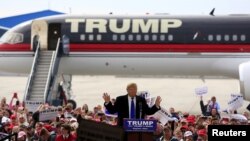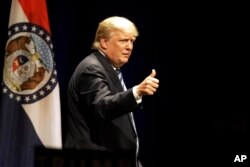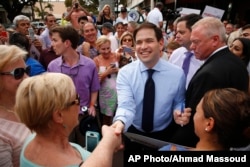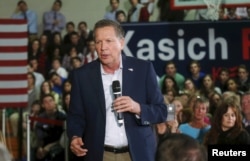Republican presidential candidate Donald Trump is blaming Democratic candidate Bernie Sanders and his supporters for what he says was a planned disruption that forced him to cancel a Chicago rally Friday night.
Fights broke out among several Trump supporters and opponents before police cleared the crowd. Many of the protesters chanted "Bernie, Bernie" and waved Sanders signs.
Police made five arrests.
Campaigning Saturday in Cleveland, Ohio, Trump mocked the socialist senator from Vermont as "our communist friend."
Blaming Sanders
"Where do these people come from?" Trump asked. "They're Bernie's crowd. Hey, Bernie. Get your people in line, Bernie."
Trump complained that the Chicago demonstration was "professionally done" and accused protesters of keeping him from exercising his First Amendment right to free speech.
Sanders issued a statement Saturday denying his campaign organized the protests and blaming Trump's harsh rhetoric for provoking attacks by Trump supporters.
"What causes the violence at Trump's rally is a candidate that has promoted hatred and division against Latinos, Muslims, women and people with disabilities and his birther attacks against the legitimacy of President Obama," the Vermont senator said.
Before declaring his candidacy, Trump insisted Barack Obama was not born in the United States, had faked his birth certificate, and therefore was unqualified to be president.
Calls rhetoric 'dangerous'
Sanders' rival in the race for the Democratic nod, former secretary of state Hillary Clinton, called Trump's campaign rhetoric "dangerous" and appealed to voters Saturday to reject "this tide of bullying and bigotry and blustering."
"If you play with matches, you're going to start a fire you can't control," Clinton told campaign volunteers in St. Louis.
President Obama, speaking at a fundraiser in Dallas, added to the criticism, saying candidates running for office should be focused on making America "even better, not insults and schoolyard taunts and manufacturing facts, not divisiveness along the lines of race and faith, certainly not violence against other Americans."
Trump's rivals for the Republican presidential nomination also criticized him for conditions that incite some people to violence.
"Donald Trump has created a toxic environment," Ohio Governor John Kasich said in a news conference Saturday in Cincinnati.
Kasich said he has tried to run a positive campaign during his presidential bid. Building a campaign around negative comments, Kasich said, is "lowering the bar on American politics, [which] is not acceptable."
Trump's leading challenger, Texas Senator Ted Cruz, said that "when you have a campaign that affirmatively encourages violence, when you have a campaign that is facing allegations of physical violence against members of the press, you create an environment that only encourages this type of nasty discord."
Wyoming, District of Columbia
Meanwhile, Cruz easily won Saturday's Republican caucus in the Western state of Wyoming, picking up nine delegates. Florida Senator Marco Rubio and Trump each won one delegate, with Trump earning only 7 percent of the vote.
Republicans in Washington, DC held a primary Saturday, with Rubio edging out Kasich. Trump came in third. Rubio earned 10 delegates and Kasich the other nine.
Organizers reported thousands of Republicans turned out to vote, with some waiting as long as two hours.
Tuesday is pivotal
Five important states hold primaries Tuesday, including Florida and Ohio - winner-take-all states where the top finisher wins all the delegates instead of splitting them with the runners up. Illinois, Missouri and North Carolina also hold primaries.
Big wins by Trump Tuesday would give him a huge lead in the delegate count over Cruz and likely put the Republican nomination out of reach for Rubio and Kasich.
Polls show Trump in a close race with Kasich in Ohio. Rubio has taken the unusual step of encouraging his supporters in Ohio to vote for Kasich to reduce the chances that Trump will win all of the state's delegates.
Trump has many supporters among white working-class voters, and his blunt rhetoric and slogan promising to "Make America Great Again" could attract workers anxious about stagnating wages and years of decline in industrial jobs in the so-called U.S. "Rust Belt."
For Democrats, Clinton is far out in front in the delegate count and Sanders is relying on big support by young voters to keep his candidacy strong.







